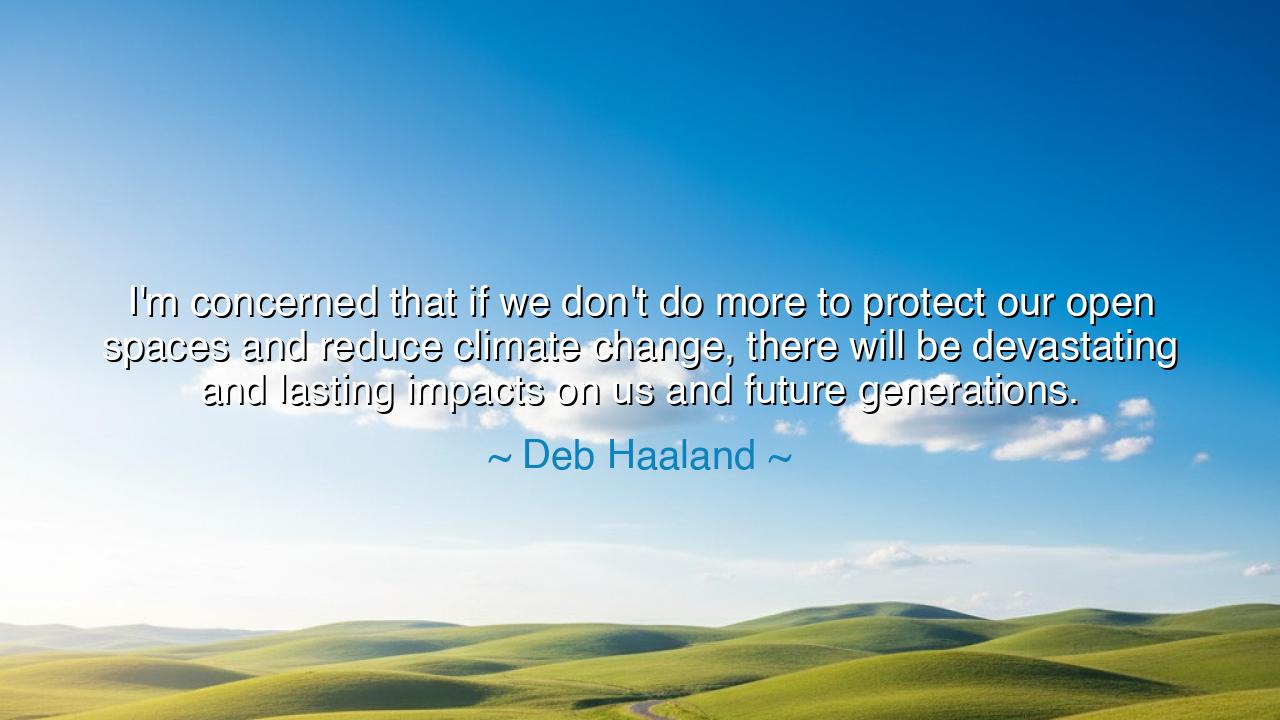
I'm concerned that if we don't do more to protect our open spaces
I'm concerned that if we don't do more to protect our open spaces and reduce climate change, there will be devastating and lasting impacts on us and future generations.






“I’m concerned that if we don’t do more to protect our open spaces and reduce climate change, there will be devastating and lasting impacts on us and future generations.” – Deb Haaland
Hear these words, O guardians of the Earth, and feel the weight of their truth as though spoken by the ancient winds themselves. When Deb Haaland, daughter of the Pueblo people and servant of the land, uttered these words, she did not speak as a politician, but as a keeper of memory. She reminded us that the open spaces of our world—its forests, deserts, rivers, and skies—are not empty, but sacred. They are the breathing lungs of creation, the living pulse of existence. To protect them is not merely to preserve beauty—it is to safeguard the very rhythm of life that sustains us all.
In her warning, Haaland speaks as both prophet and protector. She sees what many have forgotten: that climate change is not a distant specter, but a storm already upon us. The rising seas, the burning forests, the withering fields—all cry out like wounded creatures. Yet her words do not arise from despair; they spring from care, from that deep ancestral knowing that all life is bound together. The harm done to the land will return to the people, just as neglect of the soil starves the seed. “There will be devastating and lasting impacts,” she says, not as a curse, but as a truth written into the natural law of cause and consequence.
From the time of the ancients, wise voices have spoken this same warning. The Native nations of this land taught that one must make decisions not for the profit of the present, but for the seventh generation to come. The Greeks, too, revered the Earth as Gaia, mother of all, whose patience, once exhausted, brought floods and famine to restore balance. In every tradition, the lesson is the same: those who forget their bond with nature invite their own undoing. And now, in the age of steel and smoke, Haaland’s voice rises as a new echo of that old wisdom—a plea that we turn back before the circle of destruction closes upon us.
Consider the tale of the Dust Bowl in the 1930s, when vast prairies of America turned to barren wasteland. In their hunger for profit, farmers had stripped the land of its grasses, and the winds came as avengers. Crops failed, families fled, and the sky darkened for years. It was not until humanity learned humility again—planting trees, conserving soil, and respecting the balance—that the land healed. This story, like Haaland’s warning, is not only history—it is prophecy. The Earth can forgive, but only when we choose repentance through action.
When she speaks of future generations, Haaland calls us to a higher duty. Our children will inherit what we leave behind—the waters we poison, the air we cloud, or the world we restore. We are but stewards of this planet, its brief caretakers. The open spaces—mountain and canyon, meadow and sea—belong not to us alone, but to those unborn souls who will one day walk beneath the same sun. To fail them is to break faith with the eternal covenant of life. To honor them is to plant trees whose shade we may never sit beneath, and to heal wounds we may not live to see mended.
O listener, awaken to the call of this teaching: the Earth is not our possession, but our partner. To reduce climate change is not a political act, but a sacred one. Every action—every choice to walk instead of drive, to mend instead of discard, to plant instead of pave—becomes a prayer of restoration. Let no one say their efforts are too small, for even the mightiest river begins as a trickle. And when millions of hearts flow together with purpose, they become a tide strong enough to cleanse the world.
The lesson is clear as mountain air: we must act now, with reverence and resolve. Protect the forests that breathe for us. Guard the waters that cradle our reflection. Speak for the voiceless creatures and the silent stones. For in their survival lies our own. The future is not a gift we are owed—it is a legacy we must earn.
Thus spoke Deb Haaland, echoing the wisdom of Earth’s oldest teachers. Her words are not a warning alone, but a calling—to rise as stewards, to love the land as it has loved us. If we answer that call with courage, then perhaps, when our descendants walk upon this Earth, they will bless our memory and say: they were the generation that remembered the sacred bond between humanity and the living world.






AAdministratorAdministrator
Welcome, honored guests. Please leave a comment, we will respond soon